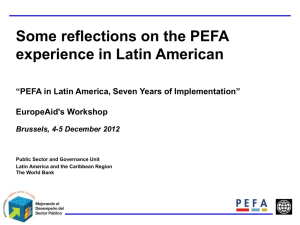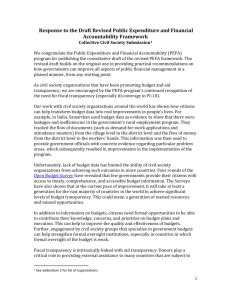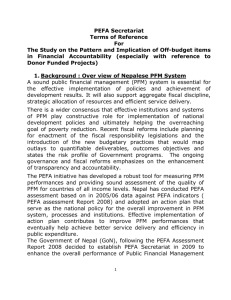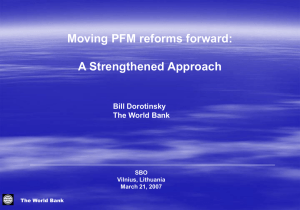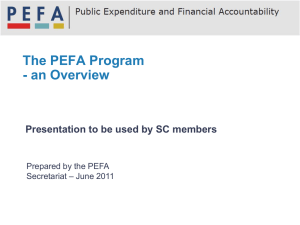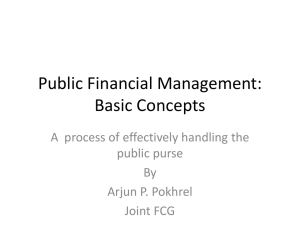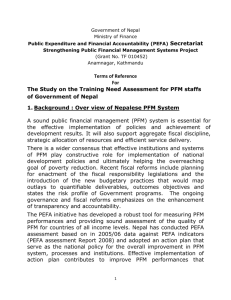Public Expenditure and Financial Accountability(PEFA) Framework
advertisement
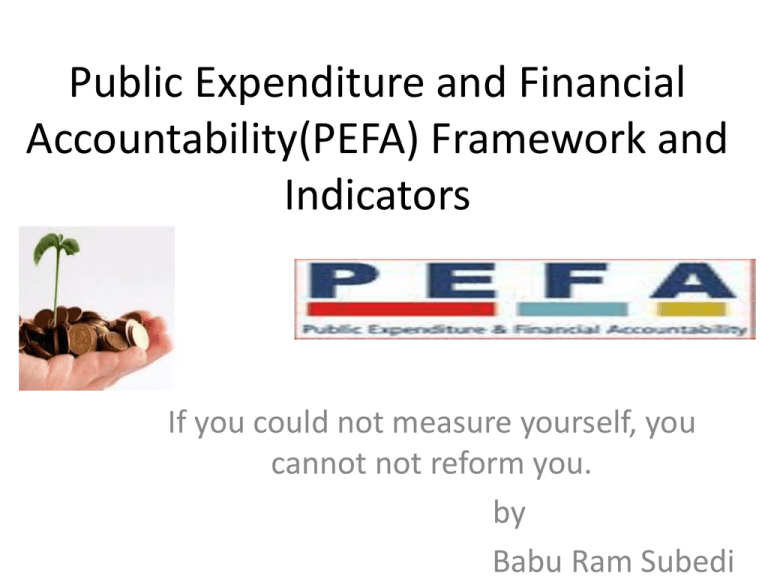
Public Expenditure and Financial Accountability(PEFA) Framework and Indicators If you could not measure yourself, you cannot not reform you. by Babu Ram Subedi What does it mean? What is PEFA Framework? • PEFA is a framework to assess country PFM performance against 28+3 indicators • A PFM Performance Measurement Framework • Assesses country PFM performance • Assessed What? PFM system, Process and Institutions More than 300 assessments done worldwide Nepal: PEFA Assessment 2008 PEFA Performance Cycle . Why PEFA Assessment? To Support PFM Results: • Aggregate Fiscal discipline • Strategic resource allocation • Efficient use of resources for service delivery PEFA Indicators There are 31 indicators for PEFA assessment: •28 for assessing country system •3 for assessing donor practices PEFA / PFM Indictors are the tools that is used to measure and indicate the actual performance in Public Financial Management 6 Indicators denotes the position . The PEFA Indicators Help Measure PFM Performance . PEFA indicators Performa nce High Level Indicators Performan ce Indicators (PI) 28+3 Thematic Groups and Indicators I. CREDIBILITY OF THE BUDGET A. PFM OUTTURNS PI-1 Aggregate expenditure outturn compared to original approved budget PI-2 Composition of expenditure outturn compared to original approved budget PI-3 Aggregate revenue outturn compared to original approved budget PI-4 Stock and monitoring of expenditure payment arrears score PEFA Indicators......... II. COMPREHENSIVENESS AND TRANSPARENCY B. KEY CROSS-CUTTING ISSUES PI-5 Classification of the budget PI-6 Comprehensiveness of information included in budget documentation PI-7 Extent of unreported government operations PI-8 Transparency of inter-governmental fiscal relations PI-9 Oversight of aggregate fiscal risk from other public sector entities PI-10 Public access to key fiscal information PEFA indicators.... III. POLICY- BASED BUDGETING C. BUDGET CYCLE PI-11 Orderliness and participation in the annual budget process PI-12 Multi-year perspective in fiscal planning, expenditure policy and budgeting C.Budget Cycle...... IV. PREDICTABILITY AND CONTROL IN BUDGET EXECUTION PI-13 Transparency of taxpayer obligations and liabilities PI-14 Effectiveness of measures for taxpayer registration and tax assessment PI-15 Effectiveness in collection of tax payments PI-16 Predictability in the availability of funds for commitment of expenditures PI-17 Recording and management of cash balances, debt and guarantees PI-18 Effectiveness of payroll controls PI-19 Competition, value for money and controls in procurement PI-20 Effectiveness of internal controls for non-salary expenditure PI-21 Effectiveness of internal audit Budget Cycle.... V. ACCOUNTING, RECORDING and REPORTING PI-22 Timeliness and regularity of accounts reconciliation PI-23 Availability of information on resources received by service delivery units Quality and timeliness of in-year budget reports PI-24 PI-25 Quality and timeliness of annual financial statements Budget Cycle VI. EXTERNAL SCRUTINY AND AUDIT PI-26 Scope, nature and follow-up of external audit PI-27 Legislative scrutiny of the annual budget law PI-28 Legislative scrutiny of external audit reports Donor Practices DONOR PRACTICES D. DONOR PRACTICES PI-29 Predictability of Direct Budget Support PI-30 Financial information provided by donors for budgeting and reporting on project and program aid PI-31 Proportion of aid that is managed by use of national procedures How They Are Scored? . B scores: Represent a level of performance ranging from good to fair by international standards C scores: Represent a level of performance ranging from fair to poor D scores: Indicate that a process or procedure does not exist at all of that is not functioning effectively 17 Objectives of PFM Reform Rationale of Assessment . Overall PFM Results .
